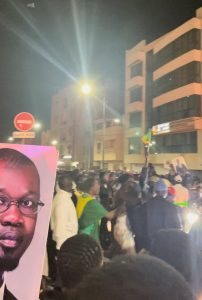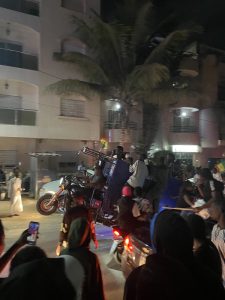Exploring Senegal: My Journey into Democracy
When I arrived in Dakar, my research was to focus on the rejection of French politics in Senegal. I thought that this subject would be addressed during the election period by the candidates and the population, which would allow me to conduct interviews and study the social networks. However, during the week of my arrival in early February, just as the whole population was eagerly awaiting the elections to elect their next leader, President Macky Sall announced in a national discourse on February 3rd that the elections would be postponed.
This led to a number of small-scale demonstrations, a mobilisation of youth, civil society, university professors and certain members of the international community such as the United States. After this event, all the Senegalese could talk about was the elections, Ousman Sonko and the rejection of Macky Sall’s continued rule. So I quickly realised that my research topic had to change and that it would be more interesting to focus on Senegalese democracy, especially as I was living through a historic moment for the country.
In terms of methodology, I had planned to conduct semi-formal interviews and engage with people on the streets while studying social networks. Upon arrival, I sent several emails to researchers and influential figures, and to my great surprise, all of them responded favorably to my request without any need for further persuasion. However, finding a time for us to meet proved more difficult, as the Ramadan period was coming to an end and Eid was approaching, a very celebrated and important holiday in Senegal. After this period, I was able to meet all of them and conduct a total of 9 semi-formal interviews.
Engaging with people on the streets turned out to be much more complicated than I thought, as I didn’t dare approach them. So, I decided to engage with people around me informally. I spoke to friends my own age, other trainees, and employees at my placement. It was also very interesting, because it gave me an insight into what young people and adults were thinking about Sonko and the elections.
One of the events that made the biggest impression on me and confirmed my desire to devote my thesis to this subject was the evening of the presidential elections on March 24th. On that evening I was with a Senegalese friend who supported Sonko. We spent the evening in front of the television, following the results that were being announced for the various towns in Senegal. At that moment, I felt the stress and excitement of the possibility of the election of Diomaye Faye, Sonko’s candidate.
When victory was officially announced, we immediately took to the streets near Ousmane Sonko’s house, where a multitude of young people and adults were celebrating, singing, dancing and shouting out the names of the new president Diomaye Faye and Sonko. It was very impressive and interesting for me. I immediately began to wonder: why do the Senegalese people attach so much importance to their democracy when the majority of neighboring countries have been hit by coups d’état? Why are young people so involved in politics? And how has Pastef, and Ousmane Sonko in particular, managed to bring so many people together and restore hope?
Photo from March 24th in the evening.
That evening, I asked around me what they liked so much about Sonko’s programme and speech. The majority of people told me that thanks to him, the whole population would pay taxes without exception, corruption would end, young people would find work and Senegal needed a younger leader who could understand the problems of Senegal’s youth.
Following this event, I had the opportunity to interview Mr. Ibrahima Kane, which turned out to be one of the most enriching experiences for my understanding of Senegalese democracy. Mr Kane is special adviser to the executive director of the Open Society Foundations Africa, where he oversees advocacy on the African Union. A qualified lawyer in Senegal and France, he has extensive experience in defending human rights. My first question was: ‘Can you tell me about the history of Senegalese democracy since independence and how it has evolved to the present day?’
“First of all, if you’re going to examine some aspects of democracy, you must first give yourself a definition of democracy that you want to apply. In this field, there are many definitions. I’m not one of those who will talk to you about specificity. I think the person who best described democracy is Alexis de Tocqueville. For him, democracy is nothing more than a conquest of rights, a conquest of freedoms, a better desire to live in a community. You see, it’s very simple, but it gives you an idea of what the democratic struggle is all about.”
“In this respect, I think it’s important to situate Senegal historically, as it’s a country that’s one of the dismemberments of the Mali Empire. The Mali Empire was the first African state that we know had a constitution. The charter of Kouroukan Fouga was backed by the hunters’ oath. This charter said that slavery was wrong, that foreigners should be respected, that the human person is inviolable. A whole set of rules that show the extent to which in this entity, there were rules that governed relations between people. When you read the hunters’ oath, it was like a human rights treaty where you have individual rights and other rights are protected. for me, it’s the starting point.”
Here are some extracts from this interview, which lasted an hour and a half and enabled me to add some valuable elements to my analysis as the precolonial period and to learn more about all aspects of Senegalese democracy.



Leave a comment
You must be logged in to post a comment.